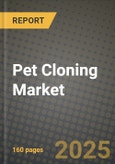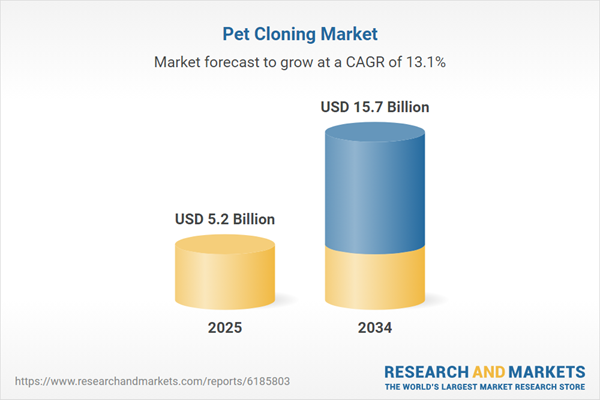Pet Cloning Market Overview
The pet cloning market is an emerging and niche segment within the biotechnology and pet care industries, driven by advancements in genetic science and the deep emotional bonds pet owners have with their animals. Pet cloning involves the replication of a pet’s genetic material to produce an identical genetic twin. This process is achieved through somatic cell nuclear transfer (SCNT), where a pet’s DNA is inserted into an egg cell, which is then implanted into a surrogate mother. While the cloned pet shares the exact genetic makeup of the original, behavioral and personality traits may vary due to environmental influences. The market is predominantly driven by affluent pet owners willing to invest in cloning services to preserve the genetic legacy of their beloved pets. High costs, ethical considerations, and regulatory frameworks still pose challenges to widespread adoption. However, increasing awareness, technological advancements, and improvements in cloning success rates are contributing to the gradual expansion of this market. With companies in countries like the United States, South Korea, and China offering commercial pet cloning services, the industry is gaining traction, albeit with ongoing debates surrounding ethical, genetic diversity, and welfare concerns.The pet cloning market has witnessed several significant developments, particularly in the refinement of cloning techniques and an increase in demand among high-net-worth individuals. Advancements in cell preservation and genetic viability have improved cloning success rates, leading to better outcomes for cloned pets in terms of health and longevity. The cost of cloning, while still high, has slightly decreased due to technological efficiencies, making the service somewhat more accessible to a broader audience. Additionally, companies providing pet cloning services have expanded their offerings to include genetic preservation, allowing pet owners to store their pet’s DNA for future cloning. The ethical debate surrounding pet cloning has also intensified, with animal welfare organizations raising concerns about the well-being of surrogate mothers and cloned animals. Some regulatory bodies are considering implementing stricter guidelines to ensure the ethical treatment of cloned pets and the animals involved in the process. Moreover, marketing efforts highlighting emotional connections and success stories have fueled consumer interest, with celebrity endorsements further popularizing the concept of pet cloning. While still a luxury service, pet cloning in 2024 is becoming a more recognized and commercialized industry within the high-end pet care market.
The pet cloning market is expected to expand as biotechnological advancements continue to improve cloning techniques, making them more efficient, cost-effective, and ethically sustainable. Gene editing technologies, such as CRISPR, may be integrated into the cloning process to enhance genetic resilience, potentially reducing the likelihood of inherited diseases in cloned pets. Additionally, advancements in artificial womb technology could eliminate or reduce the need for surrogate mothers, addressing a major ethical concern associated with pet cloning. Public perception and regulatory frameworks will play a crucial role in shaping the market's growth, with increased transparency and stricter ethical guidelines likely to be introduced. The potential for personalized genetic modifications, where owners can request specific traits or characteristics, could emerge as a new frontier in the market, although this would likely raise further ethical debates. As biotechnology firms invest more in research and innovation, pet cloning may gradually shift from an ultra-luxury service to a more widely available option for devoted pet owners seeking genetic continuity with their beloved animals. However, balancing ethical considerations with technological advancements will remain a central challenge for the industry moving forward.
Key Insights: Pet Cloning Market
- Advancements in Cloning Success Rates: Refinements in cloning techniques are leading to higher survival rates and healthier cloned pets, improving the overall viability of the process.
- Expansion of Genetic Preservation Services: More pet owners are opting to store their pet’s genetic material for potential future cloning, increasing the market for genetic banking services.
- Growing Ethical and Regulatory Scrutiny: Governments and animal welfare organizations are pushing for stricter ethical guidelines to ensure humane treatment of surrogate mothers and cloned pets.
- Integration of Gene Editing Technologies: CRISPR and other gene-editing tools may be used alongside cloning to eliminate genetic disorders, enhancing the overall health of cloned pets.
- Luxury Market Growth and Celebrity Influence: Celebrity endorsements and high-profile success stories are fueling interest in pet cloning, positioning it as a premium service within the luxury pet care sector.
- Emotional Attachment and Pet Humanization: The deep emotional bond between pet owners and their animals is a major driver, leading some to seek cloning as a way to preserve their pet’s legacy.
- Advancements in Biotechnology and Cloning Efficiency: Improvements in cloning techniques and genetic preservation are making the process more reliable and increasing consumer confidence.
- Rising Demand for Personalized Pet Care Solutions: The increasing trend of luxury and specialized pet care services is driving interest in pet cloning among affluent pet owners.
- Global Expansion of Cloning Services: More biotechnology firms are entering the market, expanding cloning services beyond the U.S. and South Korea into new regions, increasing accessibility.
- Ethical and Moral Concerns: The controversy surrounding animal welfare, genetic manipulation, and the use of surrogate mothers remains a significant challenge for the pet cloning market, potentially limiting its widespread acceptance and regulatory approval.
Pet Cloning Market Segmentation
By Product Or Type
- Deceased Pet Cloning
- Alive Pet Cloning
By Technique
- Somatic Cell Nuclear Transfer
- Gene Editing
- Other Techniques
By Application
- Dogs
- Cats
- Horses
- Birds
- Reptiles
- Other Applications
By End-User
- Pet Owners
- Research Institutes
- Breeding Centers
- Zoos
- Conservation Programs
Key Companies Analysed
- Trans Ova Genetics
- Genetix Biotech Asia Pvt. Ltd.
- PPL Therapeutics
- VectorBuilder Inc.
- Sinogene Pet Cloning
- ViaGen LC
- BioArts International
- Boyalife Group
- Cuddle clones
- Gemini Genetics
- PERPETUATE INC
- Sooam Biotech
- Oak Villlage Animal Hospital
- Bella Vista Animal Hospital
- BioVenic
- Cyagra LLC
- Embryll Life Sciences
- My friend Again
- Petslify
- RNL Bio
Pet Cloning Market Analytics
The report employs rigorous tools, including Porter’s Five Forces, value chain mapping, and scenario-based modeling, to assess supply-demand dynamics. Cross-sector influences from parent, derived, and substitute markets are evaluated to identify risks and opportunities. Trade and pricing analytics provide an up-to-date view of international flows, including leading exporters, importers, and regional price trends.Macroeconomic indicators, policy frameworks such as carbon pricing and energy security strategies, and evolving consumer behavior are considered in forecasting scenarios. Recent deal flows, partnerships, and technology innovations are incorporated to assess their impact on future market performance.
Pet Cloning Market Competitive Intelligence
The competitive landscape is mapped through proprietary frameworks, profiling leading companies with details on business models, product portfolios, financial performance, and strategic initiatives. Key developments such as mergers & acquisitions, technology collaborations, investment inflows, and regional expansions are analyzed for their competitive impact. The report also identifies emerging players and innovative startups contributing to market disruption.Regional insights highlight the most promising investment destinations, regulatory landscapes, and evolving partnerships across energy and industrial corridors.
Countries Covered
- North America - Pet Cloning market data and outlook to 2034
- United States
- Canada
- Mexico
- Europe - Pet Cloning market data and outlook to 2034
- Germany
- United Kingdom
- France
- Italy
- Spain
- BeNeLux
- Russia
- Sweden
- Asia-Pacific - Pet Cloning market data and outlook to 2034
- China
- Japan
- India
- South Korea
- Australia
- Indonesia
- Malaysia
- Vietnam
- Middle East and Africa - Pet Cloning market data and outlook to 2034
- Saudi Arabia
- South Africa
- Iran
- UAE
- Egypt
- South and Central America - Pet Cloning market data and outlook to 2034
- Brazil
- Argentina
- Chile
- Peru
Research Methodology
This study combines primary inputs from industry experts across the Pet Cloning value chain with secondary data from associations, government publications, trade databases, and company disclosures. Proprietary modeling techniques, including data triangulation, statistical correlation, and scenario planning, are applied to deliver reliable market sizing and forecasting.Key Questions Addressed
- What is the current and forecast market size of the Pet Cloning industry at global, regional, and country levels?
- Which types, applications, and technologies present the highest growth potential?
- How are supply chains adapting to geopolitical and economic shocks?
- What role do policy frameworks, trade flows, and sustainability targets play in shaping demand?
- Who are the leading players, and how are their strategies evolving in the face of global uncertainty?
- Which regional “hotspots” and customer segments will outpace the market, and what go-to-market and partnership models best support entry and expansion?
- Where are the most investable opportunities - across technology roadmaps, sustainability-linked innovation, and M&A - and what is the best segment to invest over the next 3-5 years?
Your Key Takeaways from the Pet Cloning Market Report
- Global Pet Cloning market size and growth projections (CAGR), 2024-2034
- Impact of Russia-Ukraine, Israel-Palestine, and Hamas conflicts on Pet Cloning trade, costs, and supply chains
- Pet Cloning market size, share, and outlook across 5 regions and 27 countries, 2023-2034
- Pet Cloning market size, CAGR, and market share of key products, applications, and end-user verticals, 2023-2034
- Short- and long-term Pet Cloning market trends, drivers, restraints, and opportunities
- Porter’s Five Forces analysis, technological developments, and Pet Cloning supply chain analysis
- Pet Cloning trade analysis, Pet Cloning market price analysis, and Pet Cloning supply/demand dynamics
- Profiles of 5 leading companies - overview, key strategies, financials, and products
- Latest Pet Cloning market news and developments
Additional Support
With the purchase of this report, you will receive:- An updated PDF report and an MS Excel data workbook containing all market tables and figures for easy analysis.
- 7-day post-sale analyst support for clarifications and in-scope supplementary data, ensuring the deliverable aligns precisely with your requirements.
- Complimentary report update to incorporate the latest available data and the impact of recent market developments.
This product will be delivered within 1-3 business days.
Table of Contents
Companies Mentioned
- Trans Ova Genetics
- Genetix Biotech Asia Pvt. Ltd.
- PPL Therapeutics
- VectorBuilder Inc.
- Sinogene Pet Cloning
- ViaGen LC
- BioArts International
- Boyalife Group
- Cuddle clones
- Gemini Genetics
- PERPETUATE Inc.
- Sooam Biotech
- Oak Villlage Animal Hospital
- Bella Vista Animal Hospital
- BioVenic
- Cyagra LLC
- Embryll Life Sciences
- My friend Again
- Petslify
- RNL Bio
Table Information
| Report Attribute | Details |
|---|---|
| No. of Pages | 160 |
| Published | October 2025 |
| Forecast Period | 2025 - 2034 |
| Estimated Market Value ( USD | $ 5.2 Billion |
| Forecasted Market Value ( USD | $ 15.7 Billion |
| Compound Annual Growth Rate | 13.0% |
| Regions Covered | Global |
| No. of Companies Mentioned | 20 |









